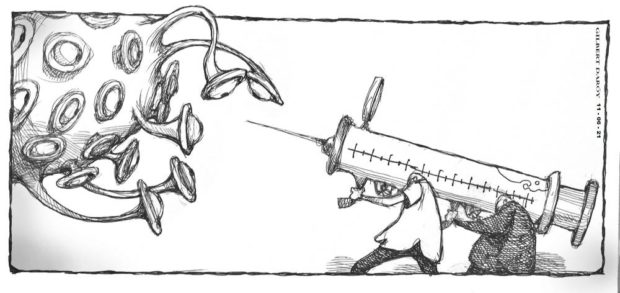Tap private sector help

When big business groups requested the government that they be allowed to use the COVID-19 vaccines they had bought as booster shots for their employees and their families, vaccine czar Carlito Galvez Jr. immediately thumbed down the appeal. Despite the oversupply of vaccines cited by the private sector, Galvez said on Nov. 24 that it would be more “moral and mandatory” for the government to prioritize vaccinating the majority of the Filipinos who have yet to receive a single dose. The Department of Health (DOH) added that businesses could donate the excess jabs to the government to address their fear of the vaccines expiring and going to waste.
A few days later, however, the government heeded the private sector’s call. But Galvez, head of the Inter-Agency Task Force for the Management of Emerging Infectious Diseases (IATF), and the DOH put in the caveat that they must follow government guidelines on which groups should first receive the additional doses, namely health care workers, seniors, and the immunocompromised. Last week, the government finally decided to allow booster shots for all adults starting Dec. 3.
Article continues after this advertisementThree cheers for the sensible turnaround, which will be a big help to the country’s vaccination drive especially given the new threat posed by the new virus variant called Omicron. The latest COVID-19 strain has already caused nervousness among investors, as reflected in the 3.52-percent dive in the benchmark Philippine Stock Exchange Index (PSEi) on Wednesday last week when news of the Omicron variant broke out.
The government’s often incoherent pandemic policy-making, not to mention the delays that shambolic system had generated, was a cause of widespread frustration over the last two years, and the initial blanket rejection of the private sector’s plea to begin using their procured vaccines seemed to fall along the same line.
When vaccinations became a viable possibility to address the health crisis in late 2020, business groups also offered to help in the vaccination drive, but the government needlessly complicated the situation when it came up with its now-abandoned tripartite agreement idea: The DOH would import all the vaccines to be purchased by the private sector, and half of the purchase should be given to the government for free.
Article continues after this advertisementThis made many companies reluctant to join the effort. The resulting wrangling delayed both the procurement of vaccines and the start of the vaccination drive, making the Philippines the laggard in vaccination efforts among Southeast Asian nations. Malacañang dropped the “donation” idea only when millions of free doses started arriving in the second quarter of 2021 courtesy of the Covax global vaccine-sharing facility, and from governments of developed countries that suddenly had excess supplies.
The erratic decision-making was even more pronounced when it came to quarantine protocols. It took the government more than a year into the pandemic before realizing that localized or granular lockdowns were the less costly option than stopping all economic activities in a city or province, or even an entire island like Luzon which generated the bulk of the country’s economic output.
The private sector has the resources, the logistical support, the managerial savvy, and the personnel to carry out large-scale undertakings; that it should be tapped to play a major part in accelerating the country’s vaccination program, to help ease the burden on the public health system and allow the economy to reopen faster, should have been a central plank of the official pandemic response early on.
The move is even more crucial now with the Philippines targeting to inoculate at least half or about 55 million of its population by the end of this year, including 80 percent of the 12.7 million minors aged 12 to 17 years. As of Dec. 1, according to the National Task Force (NTF) against COVID-19, some 36.87 million individuals have been fully vaccinated, or just a third of the country’s 111 million population. The government’s average vaccination rate of less than a million a day will not be enough to meet the national target. It has to rely on the assistance of the private sector to do this, to help preserve and build on the gains the country has achieved so far in containing the pandemic.
Socioeconomic Planning Secretary Karl Kendrick Chua suggested last week that the country should start thinking of COVID-19 as something endemic like the ordinary flu. He called for yearly vaccine boosters to keep the virus at bay and prevent any more major disruptions to economic activity, with the government shouldering the cost next year and then sharing the expense with the private sector starting 2023. This change in mindset may be what the country needs to finally exit from the economic hardships caused by COVID-19.
















